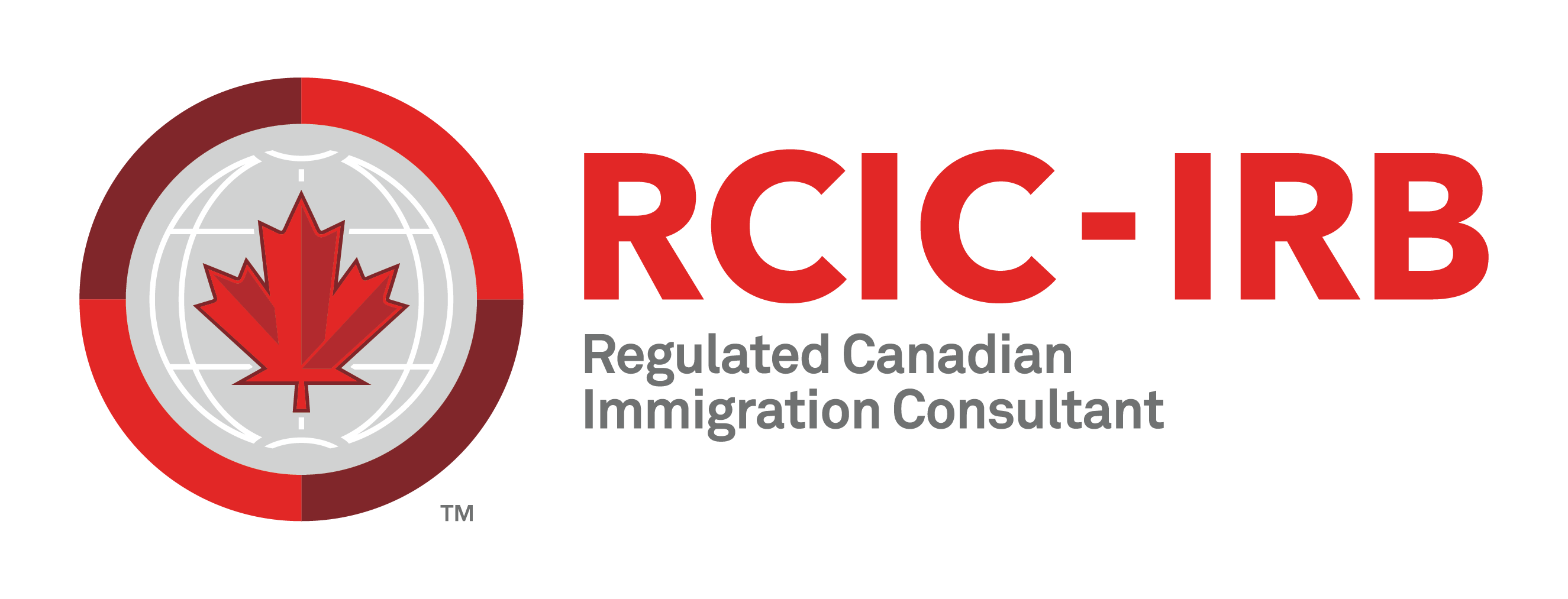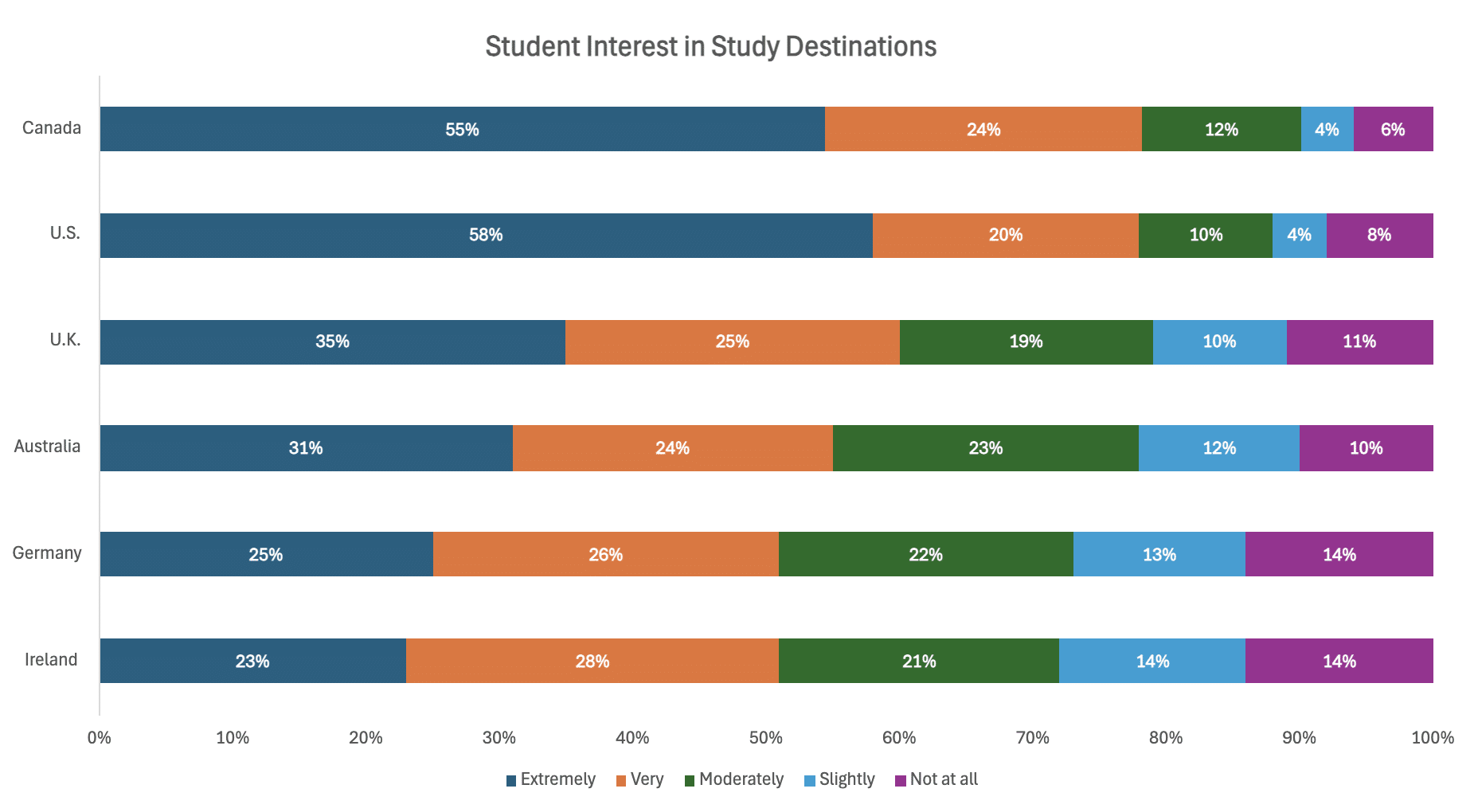Canada is the top study destination for international students by weighted average, according to a recent survey.
Of the future international students surveyed, 94% showed some degree of interest in studying in Canada—the highest of all countries garnering interest.
In fact, 65% reported that they were only considering one or more of the select six countries expanded on further below as their study destination, Canada included. This reflects an increase of eight percentage points compared with the previous year’s Spring Survey.
ApplyBoard published the results of their Spring 2025 edition of their Student Pulse Survey on March 26, 2025.
Join the Angus Reid Forum and get $5 in points!
Canada continues to be among the four most desirable countries in the eyes of international students—the others being the United States, United Kingdom, and Australia. These together are referred to as the “Big Four.”
With the following options presented to them, more students indicated they were “very interested” and “moderately interested” in studying in Canada than in any the other country in the Big Four.
While the U.S. outperformed Canada in the Spring 2025 survey by three percentage points when it came to those “extremely interested” in a study destination, Canada came out on top overall when interest was averaged across all levels.
Compared to the Spring 2024 Student Pulse Survey, those “very interested” in Canada as a study destination went up two percentage points, while moderate interest went from 8% in the Spring 2024 survey to 12% this year—a 4% jump.
Canada also stood out with the lowest share of students indicating no interest in studying there (6%), whereas other countries saw higher levels of disinterest.
In addition to the other top three study destinations mentioned above, Germany and Ireland secured fifth and sixth place.
Below is a snapshot detailing how Canada ranked among the top countries future students indicated interested in.
Survey results showed that only 35% of contributors are considering studying at international destination outside these six countries.
The top factors driving student interest
When considering which study program to choose, and which country to pursue it in, the top five factors influencing future students’ decisions included the following:
- Affordable tuition fees (77%);
- High graduate employment rate (57%);
- A program leading into one’s chosen career (49%);
- High-quality teaching (47%); and
- The program’s reputation (45%).
Affordability was particularly important to participants when selecting a study program and study destination.
Due to financial concerns, just over one in four international students were rethinking their original study destinations and considering alternatives.
Making up seven of the top 10 write-ins, European countries—such as Denmark, Finland, and the Netherlands—stood out as alternatives to the top six destinations mentioned earlier, with participants highlighting their lower tuition costs as a major draw.
Furthermore, 11.3% of survey respondents are looking into shorter programs, such as three-year bachelor’s degrees, to skirt high tuition costs.
Despite concerns over cost, only 9% plan to defer their studies to a later date.
Levels of study seeing the most interest
Compared to the Spring 2024 Student Pulse Survey, international students have shown an increased level of interest in graduate programs.
Over half of respondents (57%) have indicated they’re considering pursuing a master’s degree, reflecting an approximate increase of 7 percentage points since Spring 2024.
As for PhDs or other doctoral degrees, interest has risen by four percentage points year over year.
The remaining levels of study have seen decreased interest, though a larger number of students have indicated they’re considering pursuing them:
- Undergraduate degrees (29.3% vs 25.5%);
- Post-graduate certificates or diplomas (20.9% vs 18%); and
- Undergraduate certificates or diplomas (14.7% vs 12%).
Once their studies were complete, the most frequently mentioned career or related keywords that students were interesting in included
- Engineering; and
- Nursing (along with, more generally, health care).
After the above-mentioned careers, “lecturer,” “researcher,” and “human resources” tied for third place.
Have government and policy changes impacted interest?
The federal government’s new policy of capping study permit applications does not appear to have reduced interest in Canada as a study destination.
The number of study permits approved in 2025 dropped to 437,000, in comparison to the 517,410 study permits approved in 2024. Meanwhile, 30% of international students report that their interest in studying in Canada has increased as a result of recent changes, while 18% report it as having “somewhat increased.”
Just under 29% of international students have expressed that recent government and policy changes have had no impact on their interest in Canada as a study destination.
This makes good sense.
With it now being more difficult to obtain a Canadian study permit, the value and prestige of studying in Canada as an international student has increased,
Furthermore, fewer international student graduates means a less competitive job market for those intending to remain in Canada working on a post-graduation work permit (PGWP) after having completed their studies.
Canada, along with the U.S., are the two countries making up the Big Four that have seen policy and government changes having the greatest impact (positive or negative) on student interest to study in either of these locations.
How to apply for a study permit
If you want to study at a Canadian learning institution for more than six months, you must obtain a study permit from Immigration, Refugees and Citizenship Canada (IRCC).
Getting a study permit requires meeting certain eligibility criteria outlined by IRCC:
- Receiving a Letter of Acceptance (LOA) from a Designated Learning Institution (DLI).
- Securing a Provincial Attestation Letter (PAL) from the province or territory where your chosen DLI is located (unless you meet exemption criteria).
- Proving your ability to financially support yourself (along with any applicable family members) and pay for
- First-year tuition;
- Living expenses; and
- Round-trip travel costs.
Additionally, you must not be inadmissible to Canada (e.g. criminally or medically) and must satisfy an immigration officer of your genuine temporary resident intent.
Most foreign nationals must apply for a study permit from outside Canada.
Some foreign nationals, such as US citizens, are eligible to apply for study permits from within Canada or at a port of entry.
Note: Processing times for study permits can vary due to numerous factors, including the country you are applying from. You can check estimates here.
Study to immigrate pathways
If you graduate from an eligible Canadian post-secondary institution, you may qualify for a post-graduation work permit (PGWP).
These are open work permits, meaning that they do not tie you to a specific employer. As a holder of an open work permit, you’re authorized to work for most employers for most industries in Canada.
Such permits can be issued for up to three years in duration (depending on the length of your study program) allowing you to accumulate Canadian work experience and/or acquire a job offer.
Having Canadian work experience is beneficial in that it allows you to become a more competitive candidate for permanent residency under Canada’s economic immigration pathways—including Express Entry and enhanced Provincial Nominee Program (PNP) streams.
Consider the following for Express Entry: If you’re issued a PGWP for its full-length (three years) and you work during that time, you can gain 64 points towards your Comprehensive Ranking System (CRS) score.
Furthermore, through skill transferability factors you can gain
- Up to 50 CRS points for having at least two years of Canadian work experience and a post-secondary education; and
- Up to 50 CRS points for having three years of foreign work experience and two or more years of Canadian work experience.
If your plan is to study to immigrate, take the time to ensure your program indeed meets the eligibility requirements to be issued a PGWP.
You have up to 180 days after you graduate to apply for a PGWP.
Discover your options to study in Canada










